Downloaded from www.mymenopausecentre.com
Direct URL: https://www.mymenopausecentre.com/symptoms/hair-changes/
Menopause and hair changes
Hair can thin out all over, or from the crown or sides. The condition can also cause hair to become brittle and make new hairs finer.
Explore
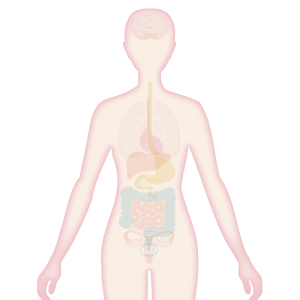
Book an appointment
The highly experienced doctors and nurses in our menopause clinic are here to help you. Appointments from £190.
Book An AppointmentIf you would like to learn more about the impact of your symptom(s) complete our free online menopause questionnaire here.
What are menopause-related hair changes?
It’s common to see and feel changes to your hair in the menopause transition. Experiencing hair loss or hair shedding can be a common and unwelcome symptom. Of course, this can be distressing for those affected as our hair plays a vital role in how we look and feel about ourselves.
There are different types of hair loss. You may experience telogen effluvium, which is diffuse hair loss – this means your hair can become generally thin all over.
Other women experience hair thinning called androgenetic alopecia – or female pattern hair loss – where the thinning is mainly over the front and top of your scalp and down the sides of your head. The hairline generally stays the same and, unlike in men, baldness is rare. Individual hairs become more widely spaced and are shorter and finer.
What causes hair changes?
Everyone sheds around 30-150 hairs a day regardless of whether we’re menopausal or not, and not everyone going through the menopause will experience hair loss.
It’s worth taking a moment to understand the hair growth cycle and what’s happening in the growth and shedding of hair.
Hair grows around 1cm a month in anagen – the growing phase – and will continue to grow from anywhere between two and six years. The range is why some women can grow their hair to be really long, and others can’t.
The next phase is catagen, the transition phase where hair prepares to rest and eventually fall out. This phase lasts 10-14 days.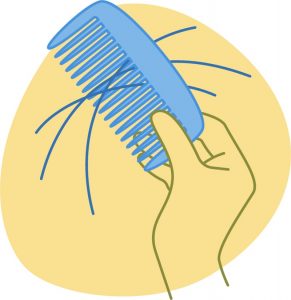
In the final telogen shedding phase, the hair falls out. The hair follicle remains inactive during this phase, which lasts for around three months. After this, the growing phase starts over again.
Oestrogen plays a part in the hair growth cycle. If you’ve had a baby, you may remember that during pregnancy, when your oestrogen levels were high, your hair was thicker, as more hair stayed in the anagen growth phase. When levels of oestrogen and progesterone drop, hair can grow more slowly and become thinner.
All women have a balance of oestrogen and androgens (the male hormone). When oestrogen levels drop in the perimenopause and menopause, your level of androgens is relatively higher. Androgens shorten the duration of the anagen stage of hair growth for some, but not all, women.
The result is female pattern hair loss, called androgenic alopecia. Whether the balance changes will affect your hair or not is usually linked to genetics.
Stress can also affect your hair, as can diseases of the thyroid gland, low iron levels and some medication.
How many women typically experience hair changes?
For some women, female pattern hair loss increases with age, and over 70% of women aged 70 or over experience hair loss to some degree[1].
Around 50% of women notice hair thinning and hair loss as they go through the menopause. The average age at which this starts is the early 50s but can begin earlier[2].
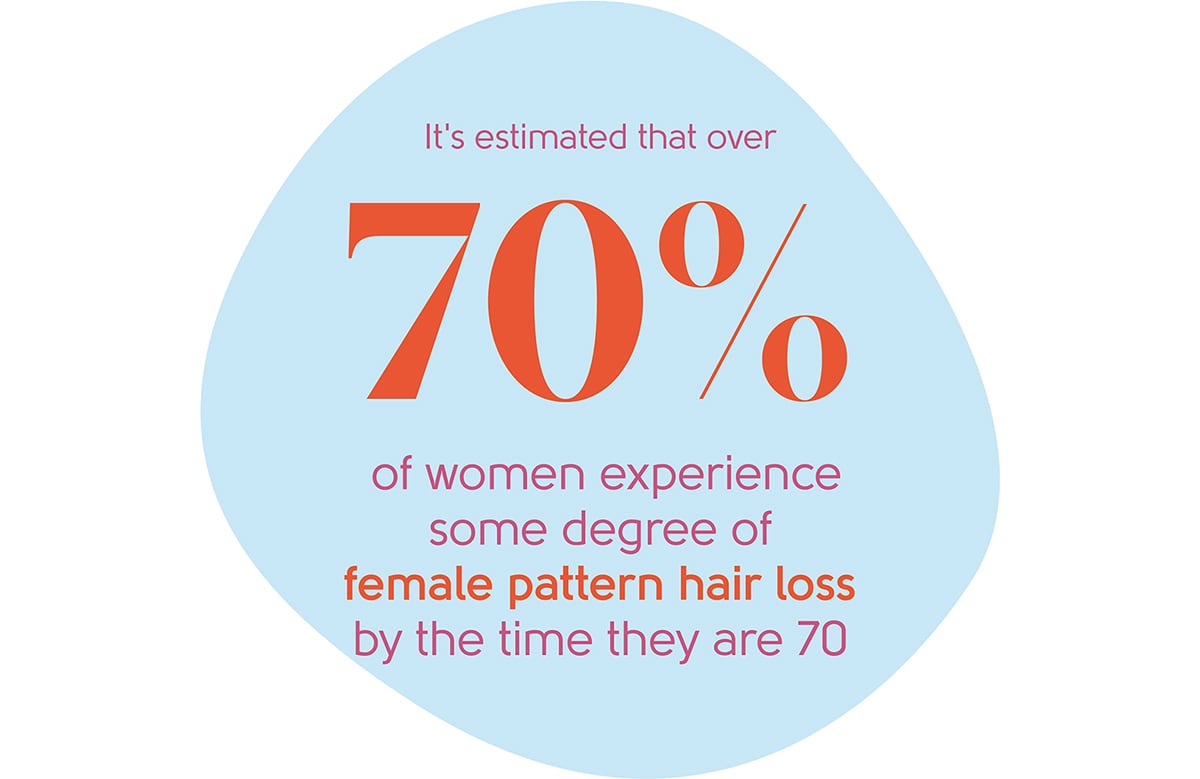
Are hair changes linked to any particular stage of the menopause?
Hair loss can affect women before the menopause and increases as you transition through the menopause and beyond.
How can hair loss be treated?
We understand that if you’re losing your hair to any degree, it can be distressing. Unfortunately, it’s challenging to treat. If your hair loss is related to the menopause, it may help to know that the degree to which you are losing it usually slows down over time.
Like most symptoms, there are some lifestyle changes that you can make to help the situation and give your hair the very best chance:
Exercise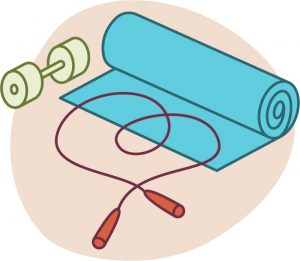
Even a little can make a difference to general wellbeing as well as some physical and psychological menopause symptoms. While exercise will not cure hair loss, it’s a great stress buster which is an important factor for hair loss in many women. Our friends at Her Spirit can help find an activity for you and provide the support to do it.
Stop smoking
Heavy metals in cigarette smoke may make your hair loss worse. The NHS has a quit smoking service to help support you.
Eat a healthy diet
One that includes food containing iron, protein, fresh fruit and vegetables may be helpful. A dietician or nutritionist can help find the right diet to help with this and other menopause symptoms. You can find out more about our nutritionist partner here.
Supplements
These could help if your diet is restricted.
Scalp and hair care
Heat and the pull of styling tools are a common cause of hair damage. Find an understanding hairdresser and ask about the best ways to style delicate and thinner hair.
Thickening sprays and products
These are designed to make your hair look thicker.
Wigs
These are a great way of covering thinning hair. They can protect your hair from styling, drying, heat and colouring, hide the thinning and restore confidence. You may be able to get a wig via the NHS – speak to your doctor or dermatologist.
Hair loss lotions
These can temporarily stop hair loss while you’re using them but are not generally available on the NHS. Prescribed medications that are not licensed for this purpose may benefit some women but must be prescribed by a doctor.
Protect your scalp
Hair isn’t just decorative; it also protects the scalp from sunlight. If your hair is thinner, experiment with hats, wigs, scarves or using sunblock.
Talk to your doctor
Check that any medication you’re taking isn’t causing hair thinning.
Low-level laser therapy
This may help[3] but isn’t available on the NHS. If you decide to try it, make sure you’re using a trained, registered specialist.
Support groups
These can be helpful if you’re finding hair loss distressing. Most focus on alopecia areata, where there can be complete baldness, but will also offer general support with hair loss too. You can find out more at Alopecia UK.
When should you see a doctor?
It’s important to see a doctor if:
- You have sudden hair loss
- You develop bald patches
- You’re losing hair in clumps
- Your head also itches and burns
- You’re worried about your hair loss
Blood tests can be helpful to rule out thyroid disease and to make sure that you’re not low on iron. A referral to a dermatologist can be a good idea as they may be able to give more specialist advice on treatment options.
Interested in learning more about hair loss and ways to manage it? Why not check out this blog from trichologist and hair loss expert Demi Griffith about how the menopause affects hair and hair loss, what to look out for in terms of symptoms and the solutions that she recommends, or watch this brilliant, informative webinar with Demi:
What next?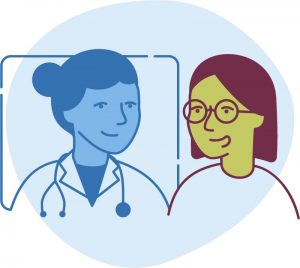
If you’re concerned about hair thinning or hair loss, talk to your GP. If you would like to discuss your symptoms in the context of the menopause, book an appointment with our menopause clinic.
If you think you may be experiencing symptoms of the menopause transition, you can learn more with our symptom checker or by taking our Menopause Questionnaire.
You can also find more information about the menopause transition at the British Menopause Society and the National Institute for Health and Care Excellence.
Authored by:
Dr Clare Spencer
Registered menopause specialist, GP and co-founder; see Dr Clare in person at The Spire Hospital, Leeds or online
Last updated:
05/02/2024
Book an appointment
The highly experienced doctors and nurses in our menopause clinic are here to help you. Appointments from £190.
Book An AppointmentLearn more
Join the pause. community
We’ve created pause. as a space for women to come together and share stories about their menopause experience, ask questions, and to find support and inspiration. We'll also share the latest news and updates on the menopause from our experts.
Want to be the first to hear our latest news? Join our pause. community today.
Share your email to receive the latest news, updates and information on new products and treatments from My Menopause Centre and our pause. community. You can unsubscribe at any time.
We're committed to protecting and respecting your privacy - see our Privacy Policy and Terms and Conditions

Book a consultation
Whether you want to discuss your symptoms, create a treatment plan that's right for you, understand some test results or have a check-up, the highly experienced doctors and nurses in our menopause clinic are here to help you.
Book nowReferences
-
Source: https://www.nhs.uk/conditions/hair-loss/coping-tips-for-women/
-
Source: Dinh QQ, Sinclair R. Female pattern hair loss: current treatment concepts. Clin Interv Aging. 2007;2(2):189-199.
-
Source: Avci P, Gupta GK, Clark J, Wikonkal N, Hamblin MR. Low-level laser (light) therapy (LLLT) for treatment of hair loss. Lasers Surg Med. 2014;46(2):144-151. doi:10.1002/lsm.22170.
Contact My Menopause Centre
- General enquiries: hello@mymenopausecentre.com
- Book appointments online: Log into your account and go to 'My appointments'
- Book appointments by phone: 0333 444 1067
- Website: https://www.mymenopausecentre.com


















